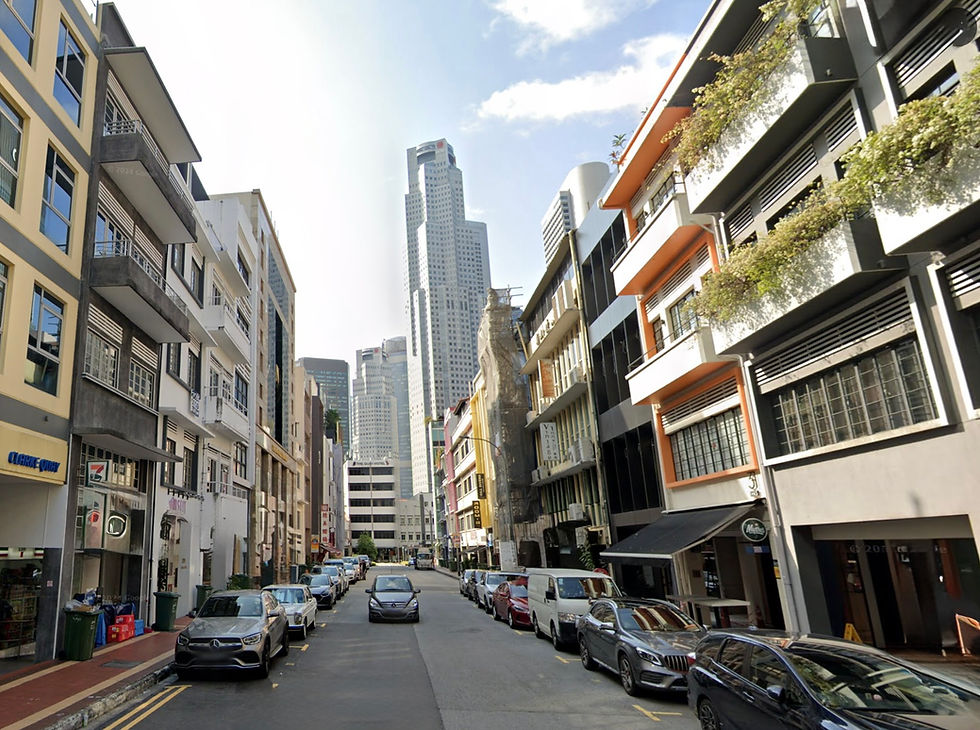Why Foreign Funds Like to Invest in Singapore Conservation Shophouses?
- Vincent Ow

- May 9, 2025
- 3 min read
Updated: Jun 15, 2025
Singapore’s conservation shophouses have become one of the most coveted real estate investments in Asia. These heritage-rich properties, characterised by their ornate facades and historical significance, have drawn attention from high-net-worth individuals, institutional investors, and foreign funds alike.

High-Profile Foreign Interest
One of the most talked-about deals who made headlines in 2022 for purchasing a cluster of conservation shophouses along Duxton Road through a family office.
The estimated value of the purchase exceeded S$50 million, signalling strong confidence in Singapore’s property stability and the heritage shophouse sector. Other notable foreign players include:
Family offices and funds, who have been quietly acquiring multiple shophouse blocks.
Indonesian and Chinese ultra-high-net-worth individuals, who invest conservation shophouses as a diversification strategy and a base for family offices or boutique firms.
But what exactly makes these properties so attractive to HNW investor?
1. Scarcity and Historical Value
Conservation shophouses are a finite asset. With only around 6,500 conservation shophouses protected by the Urban Redevelopment Authority (URA), supply is strictly limited. This makes them akin to luxury collectibles — unique, irreplaceable, and culturally valuable. Investors are often drawn to such rare assets for long-term capital appreciation and prestige.
2. Attractive Yields and Capital Appreciation
Compared to standard commercial properties, conservation shophouses located in prime districts such as Chinatown, Tanjong Pagar, Kampong Glam, and Little India often command premium rents. In recent years, yields have averaged between 2.5% and 3.5%, with strong capital appreciation potential due to urban revitalisation, rising demand from F&B and co-working tenants, and growing interest from private investors.
3. Singapore’s Political and Economic Stability
Foreign investors value Singapore for its political neutrality, pro-business environment, and transparent legal system. These qualities make property investment — especially in a limited and culturally protected asset class — a relatively low-risk endeavor.
4. Flexibility of Use
Unlike many other heritage buildings worldwide, Singapore’s conservation shophouses allow for a variety of uses, including retail, F&B, boutique offices, co-working spaces, and even upscale residential living. This mixed-use flexibility attracts investors looking for multi-purpose income streams.
5. The Appeal Freehold Titles
Another key reason investors — both foreign and local — are drawn to conservation shophouses is the availability of freehold titles, particularly in city-fringe and mature districts. Unlike 99-year leasehold properties, freehold shophouses offer perpetual ownership, making them highly desirable for long-term wealth preservation and intergenerational planning.
6. Government Protection Adds Value
Because these buildings are protected by URA, their architectural integrity is preserved, and their surroundings are often beautified or revitalised. This government backing adds confidence for long-term holding, as the value is unlikely to be eroded by sudden overdevelopment or changes in zoning.
Conclusion:
In recent years, as demand continues to outstrip supply, popular areas such as Districts 1, 2, 7, and even 8 have seen rapid price increases — with transactions in District 1 reaching as high as $12,000 per square foot. This sharp price growth has led to a decline in transaction volume, as investors become more selective and adopt a “wait-and-pick” approach.
So, does this mean that individual investors are priced out of the shophouse market? Not necessarily. In fact, individual investors with around $1 million in capital can still find opportunities in more affordable districts such as 12, 14, 15, and 19, where shophouse prices typically range from $3,500 to $5,000 per square foot. In 2024, transaction volumes in these areas have shown signs of growth, reflecting rising interest from value-conscious buyers.
Ready to Explore Conservation Shophouse Investment?
Unlike any other property investment, navigating the shophouse market takes expertise — from understanding zoning laws to how the performance of which district and selecting high-growth districts
Subscribe To Our Newsletter - Gain valuable insights and data-backed analysis to deepen your understanding of shophouse investments. With over a decade of experience, I help owners market their shophouses and guide buyers and investors in securing the right property to meet their goals and budget. Feel free to reach out with any questions or enquiries.
Others Topic:


